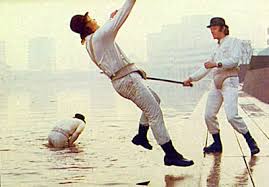I've always had a deep admiration for Stanley Kubrick. He crafted my all-time favorite war movie (Full Metal Jacket) as well as the best (and probably only) science-fiction-as-philosophical-manifesto 2001: A Space Odyssey. So I already had high hopes when I sat down to watch A Clockwork Orange for the first time in full (I'd probably seen most of it before, but in bits and pieces over the years, not as a whole film). And I'm happy to say that it's another entry in the master filmmaking class that is the Kubrick filmography.




The film revolves around Alex, a Droog in post-war, futuristic London. Alex and his fellow Droogs thrive on three things: drugged milk, sex, and violence. At night, they stalk the streets of London, looking for people to maim and rape. However, when one night goes awry, Alex finds himself in the custody of the police, and then scientists who are looking to "cure" him.
It's an incredibly bleak film. Released at the height of the Nixon administration, with America (and the rest of the world) caught in the mire of Vietnam and Cold War politics, and Britain still lapping the wounds of WWII. And the promises of a new age have given way to cynicism, as evidenced by the film's main themes. No matter what Alex does, he's left alone and without help: as leader of the Droogs, he lives a life of rape and villainy; the government and scientists prove to be no more of a help, performing torturous, Nazi-like experiments on him in the name of social justice; and post-cure life doesn't end up being any easier. In fact, Alex seems to be happiest in his anarchic life at the beginning of the film. Kubrick's film, like the book it's based on, has a lot to say about the current state of things, then and even now (honestly, how much has actually changed, and is any of it actually for the better?).
Another aspect of the film that works well is it's total immersion into a world that is at once foreign and familiar. The dialect is littered with an invented language and recalls the grammar of Victorian English, even though it's set in the future. Likewise there's plenty of erotic art, indicating a breakdown of moral society, though it's still not too far removed from our own. The film is comfortable in it's own universe, even though audience members aren't likely to be comfortable in it. It should be known that there is a lot of sex and graphic violence in this film, the latter of which is shocking even by today's Saw standards. The infamous "Singin' in the Rain" scene is no less disturbing today than it was 39 years ago.
If there's one thing that Kubrick doesn't get enough credit for, it's his superb work with actors. Malcolm MacDowell delivers a fantastic performance here, introducing us to a magnificent talent. His Alex has clearly lost his innocence long before the film begins, but he never loses that glint of hope and curiosity in his eyes. He's the heart of the film, which is saying something, considering how cold and truly heartless the film is, thematically and visually.
A Clockwork Orange is still a masterpiece, and more than worthy of viewing in this day and age. It can be hard to stomach, but it's well worth the trip.
PS Fun bit of trivia: this film, along with 1969's Midnight Cowboy, are the only X-rated films to have ever received a Best Picture Oscar nomination. Midnight Cowboy is the only winner, however, as this film lost to The French Connection in 1971.
Comments